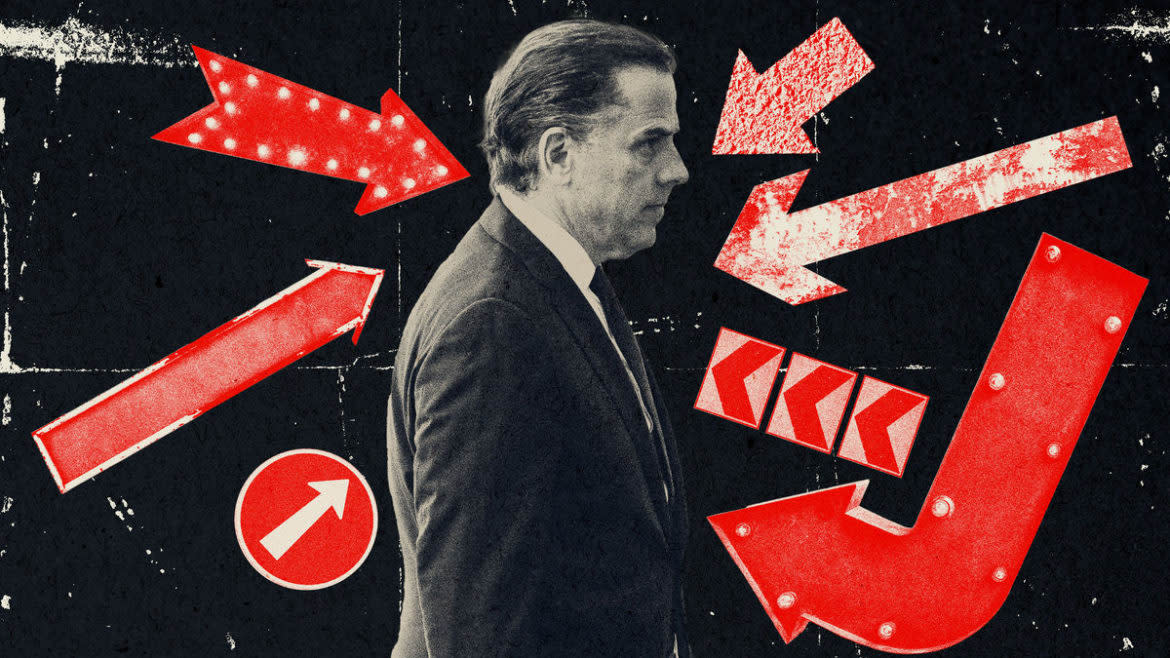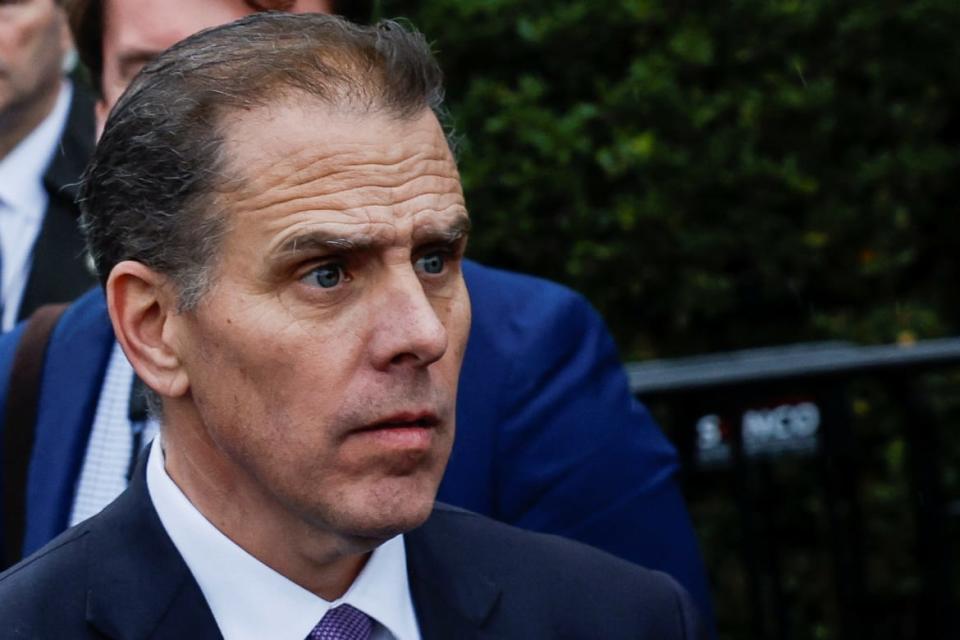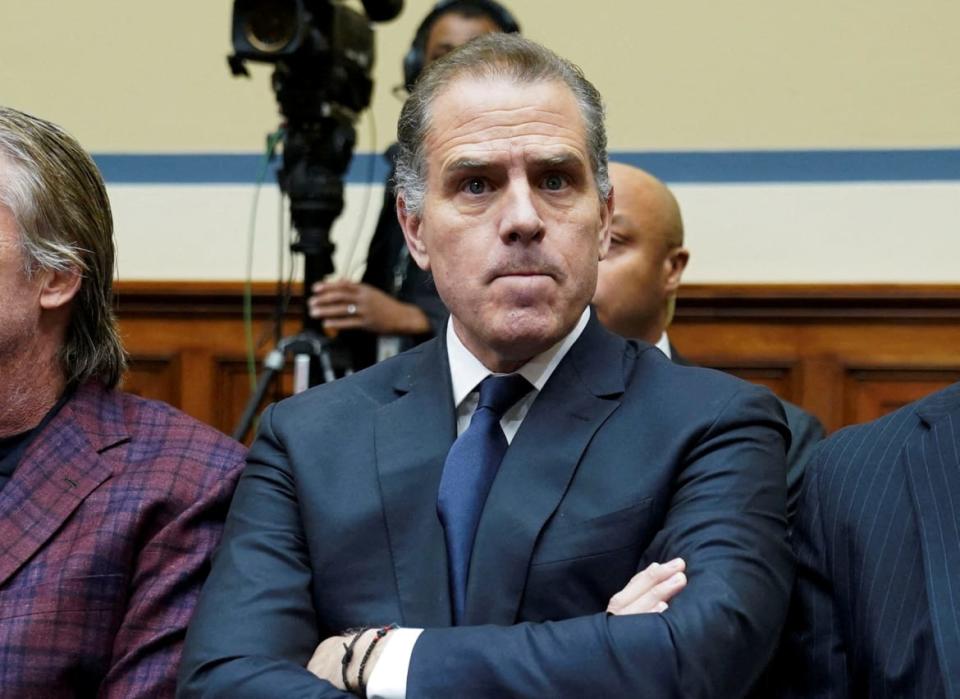GOP Reps Have a Familiar Strategy for Trump Trial: What About Hunter Biden?

- Oops!Something went wrong.Please try again later.
- Oops!Something went wrong.Please try again later.
- Oops!Something went wrong.Please try again later.
- Oops!Something went wrong.Please try again later.
- Oops!Something went wrong.Please try again later.
Pay Dirt is a weekly foray into the pigpen of political funding. Subscribe here to get it in your inbox every Thursday.
As Donald Trump’s first criminal trial begins on Monday, the former president’s defenders have been lodging a familiar list of complaints about why the case against him is misguided and unfair.
Trump’s case—stemming from a six-figure hush money payment to adult film star Stormy Daniels weeks before the 2016 election—prompted Manhattan District Attorney Alvin Bragg Jr. to bring 34 felony counts against the former president related to falsifying business records, after he allegedly tried to cover up those payments.
But for Trump’s biggest defenders in Congress, there’s a similar but far less familiar narrative that voters should focus on instead: Hunter Biden.
Judge Offers Skeptical Retort to Hunter Biden Lawyers’ Bid in Tax Case
For months, these Republicans—many of them the top impeachment officials in the House—have sown allegations of potential campaign finance violations involving Hunter Biden into media appearances and official press statements. A source with knowledge of GOP efforts to target Hunter Biden told The Daily Beast that Republicans are preparing to make the Biden campaign finance allegations a key part of their defense of Trump. And while those accusations against Hunter Biden haven’t found much traction, that may soon change.
From the day the indictment first dropped, Trump and his allies have invoked a ‘whatabout’ defense to counter the charges with accusations about the sitting president’s son. In more recent months, they’ve been laying groundwork to equate tax payments that one of Hunter Biden’s lawyers, Kevin Morris, made on Hunter’s behalf with the hush money payments that Trump’s lawyer, Michael Cohen, made on Trump’s behalf.
But experts laid out to The Daily Beast how these cases are very different—and how even the similarities reveal the emptiness of GOP concerns when it comes to Hunter Biden.
Dan Weiner, a former attorney with the Federal Election Commission and director of elections and government at New York University’s Brennan Center for Justice, told The Daily Beast that “whataboutism isn’t a defense.”
“Some people accuse Bragg of selective prosecution, but he has been proceeding incredibly carefully and has conducted himself with utmost professionalism, so I take exception at the idea that there’s any indication of any kind of political impropriety,” Weiner said.
But if Trump’s defenders attempt to equate the two cases over the coming weeks, those comparisons, no matter how seductive they may seem in the abstract, don’t appear to pass legal muster.
The Daily Beast brought the Biden allegations to experts in campaign finance law, who concluded that, vis-à-vis the Stormy Daniels payoff at the center of Trump’s trial, the scenarios were like comparing apples and ambulances.
If key details are excluded—like timing, intention, evidence, and judicially established criminal culpability—the Biden accusations do, superficially, seem to echo Trump’s charges: a lawyer making payments on behalf of a politically significant client, quashing potentially embarrassing information from surfacing in the atmosphere of a presidential election.
In the Hunter Biden scenario, his lawyer—longtime Hollywood attorney Kevin Morris—made a six-figure tax payment on his behalf in the early months of the 2020 election. Republicans have claimed that Morris, a major Democratic donor, made those payments to protect Joe Biden’s campaign, thereby effecting an impermissibly large in-kind political contribution, just as Cohen did for Trump. Notably, the same Trump loyalists who seem so far out over their skis on the Biden payments have also ceaselessly mocked Bragg’s prosecution as unmerited political sport hunting and “election interference.”
Hunter Biden’s legal team declined to comment on this report.

Hunter Biden attends the annual Easter Egg Roll on the South Lawn of the White House.
But while these two situations share some contours, experts in campaign finance law dispelled the notion that they were equivalent in the eyes of the law.
Weiner, the former FEC lawyer, explained that these cases carry a high burden of proof, and while the Trump-Cohen payments appear to meet that bar, the Biden-Morris payments likely do not.
“Prosecutors would pursue these criminal charges in only the most clear-cut cases,” Weiner told The Daily Beast. “And, leaving aside whatever one may think about the propriety of these payments, the comparison with the Stormy Daniels scenario doesn’t hold much water.”
Brendan Fischer, a campaign finance law specialist and deputy executive director of watchdog Documented, called the Republicans’ legal theory a “stretch.”
“Based on what we know right now, this theory seems like a stretch. Hunter Biden wasn’t running for office, his personal tax issues were never an issue in his father’s campaign, and there is no evidence that Joe Biden directed or coordinated the tax payment,” Fischer explained.
The experts walked through the differences. First, Weiner said, the payments must be proven to have “a clear electoral nexus.”
“With the Stormy Daniels payments, there was a clear enough electoral connection for Michael Cohen to plead guilty,” Weiner said—a connection that Justice Department prosecutors also endorsed in that case.
To demonstrate how tricky this can be, Weiner pointed to the 2012 acquittal of former Sen. John Edwards (D-NC) in a broadly similar scenario, where Edwards argued that his payments to a mistress were personal, not political. (Hunter Biden’s lead attorney, Abbe Lowell, represented Edwards in that victory. Meanwhile, the lead federal prosecutor who lost got elected to Congress.)
Trump’s Lawyers Go 0 for 3 on Last-Minute Attempts to Delay Hush-Money Trial
Trump and some legal experts have floated this argument, but other experts have dispelled the parallel—and pointed out that Bragg isn’t charging Trump with a campaign finance violation in the first place.
In Trump’s case, his then-personal attorney and friend Michael Cohen paid $130,000 to buy the silence of adult film star Stormy Daniels one week before the 2016 election, as Trump hemorrhaged public support in the wake of the leaked Access Hollywood tape. Cohen eventually pleaded guilty to federal campaign finance charges—saying in sworn court filings that Trump personally directed the payments, which constituted an illegal in-kind campaign contribution—and served a year in prison.
Then, a year after Cohen paid Daniels, then-President Trump reimbursed Cohen in a series of checks from the Trump Organization, “grossing up” the total to $420,000 to account for income tax concerns and bonus pay. But those payments were invoiced and accounted on company ledgers in a way that, according to Bragg, were improper, triggering New York criminal statutes that treat falsified business records as a felony.
In Hunter Biden’s case, his own personal attorney and friend—who met Hunter Biden at a December 2019 fundraiser for then-candidate Joe Biden—also made payments on his behalf during the 2020 election. But Jordan Libowitz, communications director for Citizens for Responsibility and Ethics in Washington, zeroed in on one fundamental difference.
“A close personal friend of Hunter Biden’s helping him with unpaid taxes to relieve pressure he faced is not remotely the same thing as Donald Trump personally causing the Trump Org to create false business records in order to hide hush money payments,” Libowitz said.
In a transcribed closed-door hearing last November, Morris acknowledged putting up more than a million dollars on his friend’s behalf for a variety of expenses in 2020, telling House impeachment investigators that the payments were structured as loans that begin coming due in 2025. In all, Morris floated his client nearly $2 million to help him resolve tax issues specifically, the vast majority of it one year after the election, with a $160,000 tax payment in January 2020.
Republicans have repeatedly alleged that the tax assistance—like the Stormy Daniels hush money—was intended to help Joe Biden’s campaign and therefore appears to be an illegal in-kind contribution in excess of individual limits. As evidence, they point to a Feb. 7, 2020, email that Morris sent an accountant, which said in part, “Emergency is off for today. Still need to file Monday—we are under considerable risk personally and politically to get the returns in.”
Morris said Hunter Biden was recovering from a devastating addiction at the time and at the “lowest point in his life.” But the averted “emergency” and the associated “political risk,” he said, were not related to the election—still nine months away. Instead, he said, he was referencing events surrounding Trump’s first impeachment trial in the Senate, where Republicans had been itching to call Hunter Biden as a witness. (A gambit that Senate Democrats were entertaining.) Two days before the email, Senate Republicans acquitted Trump, launching their own politically charged investigation into Hunter Biden that same day, when “the ink was barely dry” on the exoneration.

Hunter Biden is seen as he makes a surprise appearance at a House Oversight Committee markup.
More important, however, is the timing and intention of the actual payments. And Morris’s interview shows what appears to be a GOP effort to conflate. As one investigator asked Morris in the hearing, “If the taxes were paid as a motivation to protect Joe Biden politically, that could be considered a campaign donation?” Morris made one tax payment to block a lien, ahead of the impeachment trial, in January 2020. And while Hunter Biden finally filed his years-late returns in 2020 after that Feb. 7 email, impeachment records reveal no associated payments; the millions that Morris eventually fronted to pay those back taxes and associated fees didn’t come until October 2021, a year after the election.
Weiner told The Daily Beast that the publicly known facts don’t clear the legal bar.
“Here you have—nine months out from the election—an ambiguous statement about ‘politics’ that could have meant any number of things, and that came in close proximity to the impeachment proceedings. Notably, the other tax payments, which was most of the money here, were paid long after the election,” he said.
He’s not alone. Contemporaneous handwritten notes from January 2022, authored by IRS agent and star GOP witness Gary Shapley, show that the Assistant U.S. Attorney on the Hunter Biden tax probe didn’t believe there was a campaign finance case, either—specifically citing the circumstances as “one level further removed” from the Edwards investigation.
All experts interviewed for this article also pointed out that Hunter Biden wasn’t a candidate. While his issues were “relevant” to his father’s run, Weiner noted, “that makes the connection to any election that much more attenuated.”
The experts also noted that no one has presented public evidence that Joe Biden directed or coordinated the tax payments.
“Contrast that with the Stormy Daniels Case,” Fischer said. “There, on the eve of the 2016 election, with Trump’s infidelity a central campaign issue following the release of the Access Hollywood tape, Trump allegedly directed Michael Cohen to pay Stormy Daniels to keep her story out of the media. That evidence points towards the payment being made for the purpose of influencing Trump’s election.”
But not only have House impeachment investigators implicated Morris in this alleged crime, they also—without providing any evidence—extend the culpability to Joe Biden personally.
In a January press statement, House Oversight Chairman James Comer (R-KY) claimed that Morris’s “massive financial support” conjures “ethical and campaign finance concerns for President Joe Biden.” Morris, Comer wrote, was “paying Hunter Biden’s tax liability to insulate then-presidential candidate Joe Biden from political liability.”
In a separate opening statement ahead of a House Ways and Means hearing last month, committee chairman Jason Smith (R-MO)—who has also made these allegations on television—went further still, saying Morris’s payments evince “connections between Joe Biden and his son’s business practices” and “even to the Biden 2020 campaign.”
Trump Launches New Bid to Oust Judge in His Hush-Money Case
Smith’s statement also claimed that “investigators that were interested in pursuing a potential criminal campaign finance violation were told to stand down.” Here, Smith appears to undercut his own case. He appears to be referencing a May 2021 memo and those 2022 handwritten notes from Shapley, where the prosecutor cites Edwards.
The day Trump was indicted, Smith called Bragg’s case “so questionable that any other respecting [sic] prosecutor would have long since walked away from it.”
But there’s an extra element needed to bring this particular criminal charge.
“Normally, ignorance of the law is no excuse. In this particular area of law, though, it’s a little different,” Weiner said. That’s because campaign finance violations are typically civil charges in nature, not criminal.
“To be found criminally liable for breaking laws, the violation has to be ‘knowing and willful,’ meaning not only that you acted intentionally, but that you should have a sense of it being illegal,” Weiner said.
In Morris’s testimony, investigators pressed him about a meeting between him, his client, and other lawyers at his house in January 2020, ahead of the payments. If Morris, an attorney himself, followed the advice of a campaign finance lawyer when making the payments, that may work in his favor.
“Assuming they provided all relevant facts and then followed the advice given, getting the all-clear from a campaign finance lawyer would certainly be a mitigating factor,” Fischer said.
Weiner agreed that this would be a defense. “Of course, you can’t just go to your cousin Vinny; you’d have to talk to someone who had some expertise in the area,” Weiner said.
Lastly—but perhaps most importantly—there is the matter of Cohen’s guilty plea and the DOJ’s written statement in approval. If there was no crime, Cohen, a key participant in the alleged scheme, seems to disagree. The same can be said of most legal scholars, who have largely agreed this is an open-and-close case of campaign finance impropriety.
Remarkably, Trump has challenged even this indisputable fact.
“Virtually every legal scholar says they don’t understand it, that there’s no crime,” Trump falsely said outside the Manhattan courthouse in February.
“Even if he was guilty of something, there’s no crime,” he added. “So I will say that, uh, enjoy it.”
Get the Daily Beast's biggest scoops and scandals delivered right to your inbox. Sign up now.
Stay informed and gain unlimited access to the Daily Beast's unmatched reporting. Subscribe now.

